President of the Executive Board Daniël Wigboldus steps down: ‘Taking complicated decisions requires care’
-
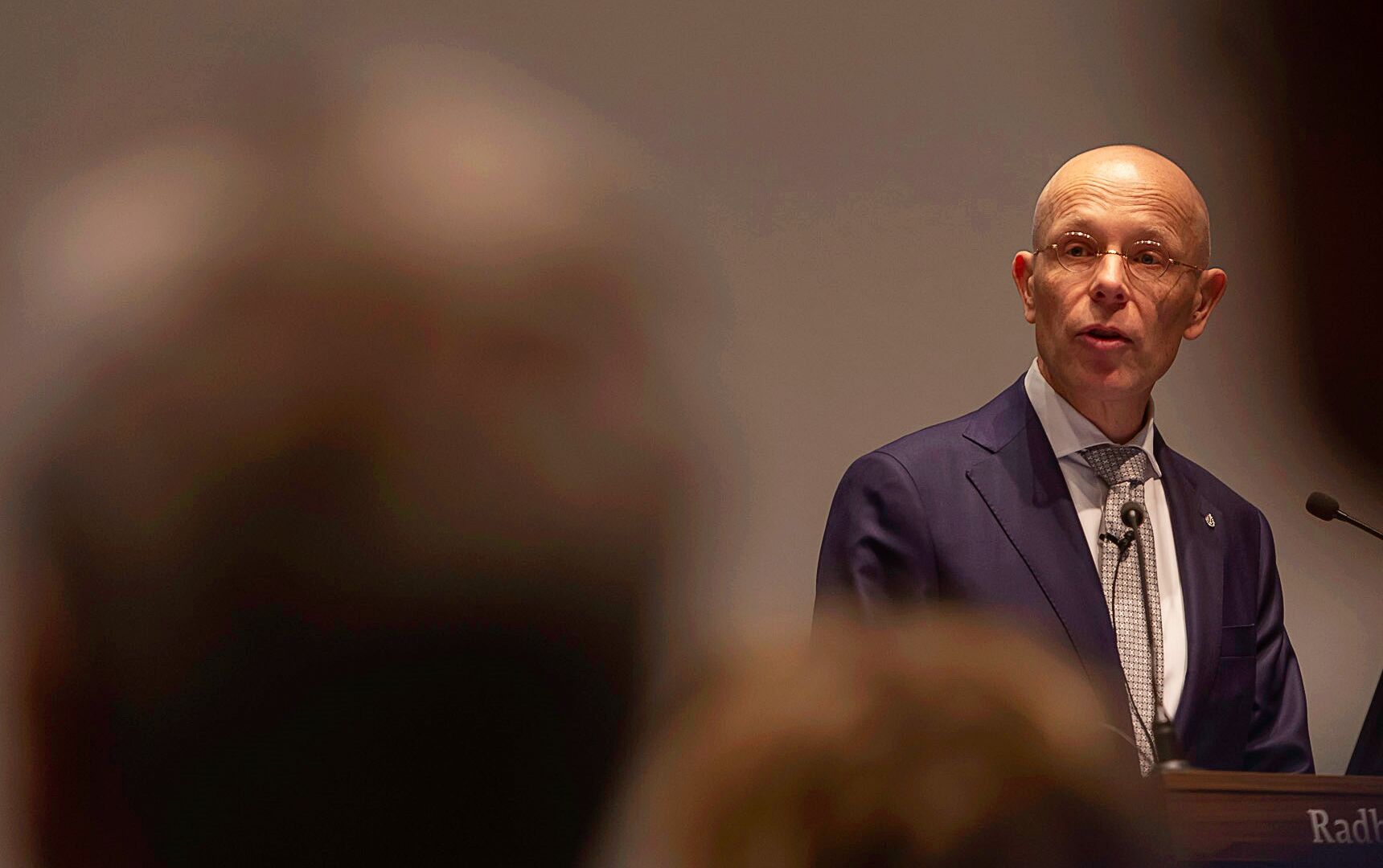 Daniël Wigboldus op de Nieuwjaarsrede van 2020. Foto: Dick van Aalst
Daniël Wigboldus op de Nieuwjaarsrede van 2020. Foto: Dick van Aalst
By nature, Daniël Wigboldus sees himself as a connector. As President of the Executive Board, he encountered complex issues, sometimes involving literal group confrontations. How did he manage them? 'Everyone should be able to express their opinions, but that comes with the responsibility to listen.' Today, the President is stepping down.
Last summer, Daniël Wigboldus spent weeks hiking through the mountains in southern Germany. He goes to the same campsite every year. Just before the holidays, he had announced his intention to step down as President of the Executive Board at Radboud University on 1 January 2025, so he was hoping to use these long walks to make plans for the future. For example, what did he want to do after resigning as President at Radboud University?
‘I started doing long-distance walks three years ago when I was preparing for the Four-Days Marches in Nijmegen,’ Wigboldus explains. The social psychologist discovered that extraordinary things happen in your head while you’re walking. ‘For the first two hours, you are still in the here and now. You are still thinking about your to-do list for the next day. But if you walk for long enough, other thoughts come to the fore, thoughts that you might not have been aware were still playing on your mind.’
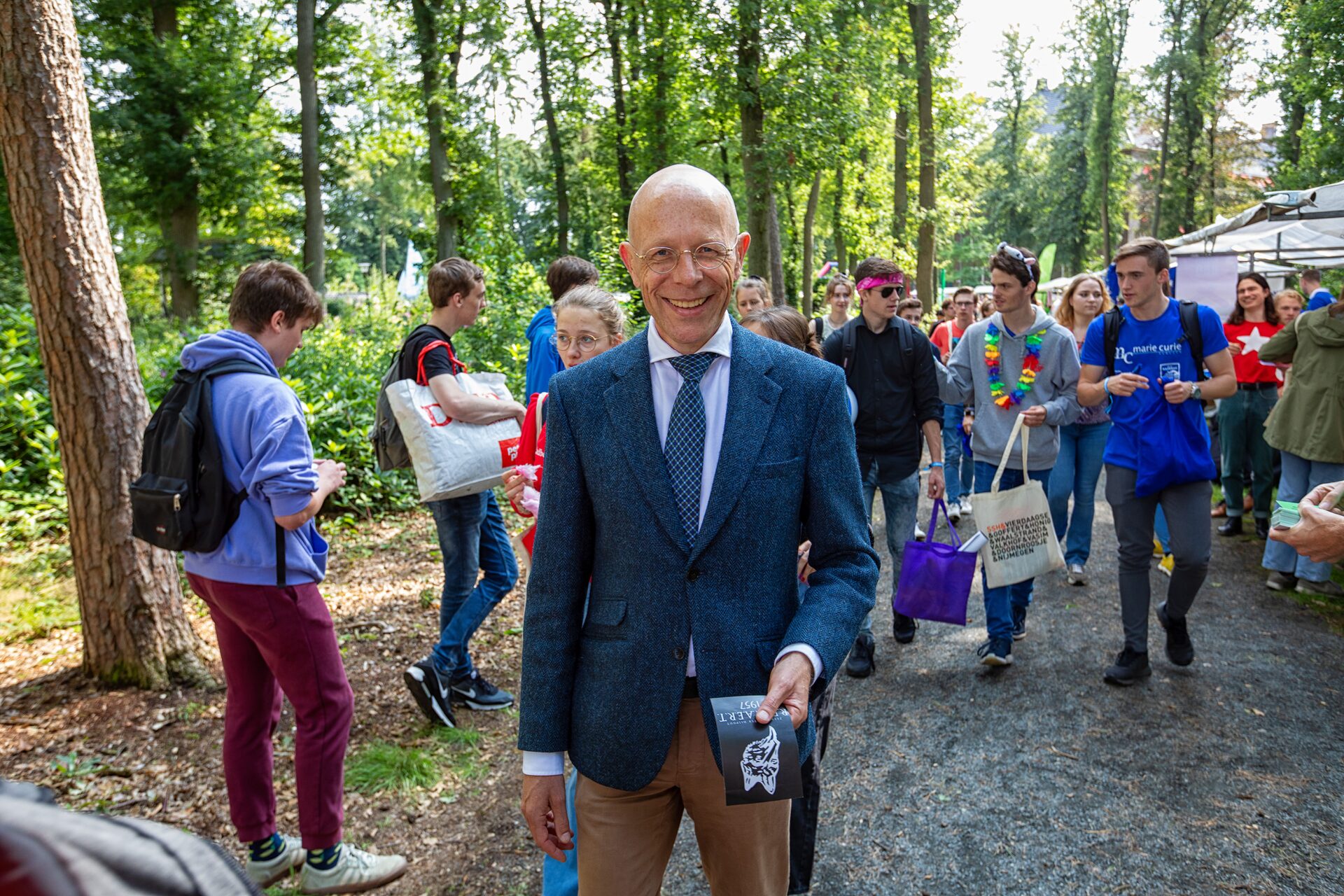
And that happened in the southern German mountains too. I hadn’t got round to looking ahead to the future yet. ‘But it was then that I noticed how much the events that had happened before the holidays had affected me. “The impact of the pro-Palestinian demonstrations on campus, but also the centenary celebrations and the departure of my colleague Han van Krieken.’
What do these events have in common?
‘As a manager, you are often required to take decisions in a specific situation and often under a certain time pressure. Something needs to be done, so the worst thing you can do is not take a decision. At the same time, those decisions have a direct impact on people for whom you also feel responsible. You need to relate to that.’
Did such difficult choices contribute to your decision to step down as President of the Executive Board several months earlier than planned?
‘No, there was a practical reason for that. I felt that 1 January was a much more logical moment to step down than 1 May, because it would make it easier for my successor to put her mark on the next policy paper and budget.’
So, the evacuation of the Erasmus Tower and Thomas van Aquinostraat 1 in the spring, in response to the pro-Palestine protests, didn’t affect that decision?
‘Perhaps subconsciously, in the background. It was an informed decision.’
From people close to you, we understood how much the protests affected you personally.
‘They did. I wouldn’t be human if that didn’t affect me.’
What affected you most about the protests?
‘I feel that we should obviously do our best to acknowledge different opinions on campus, but occupying and damaging buildings is a boundary that must not be crossed. If it is crossed and the occupation of a building results in police intervention, that is a very distressing experience for students and staff involved in the protest. You feel responsible for that too. But that doesn’t stop you from taking the decision – and I still stand by it.’
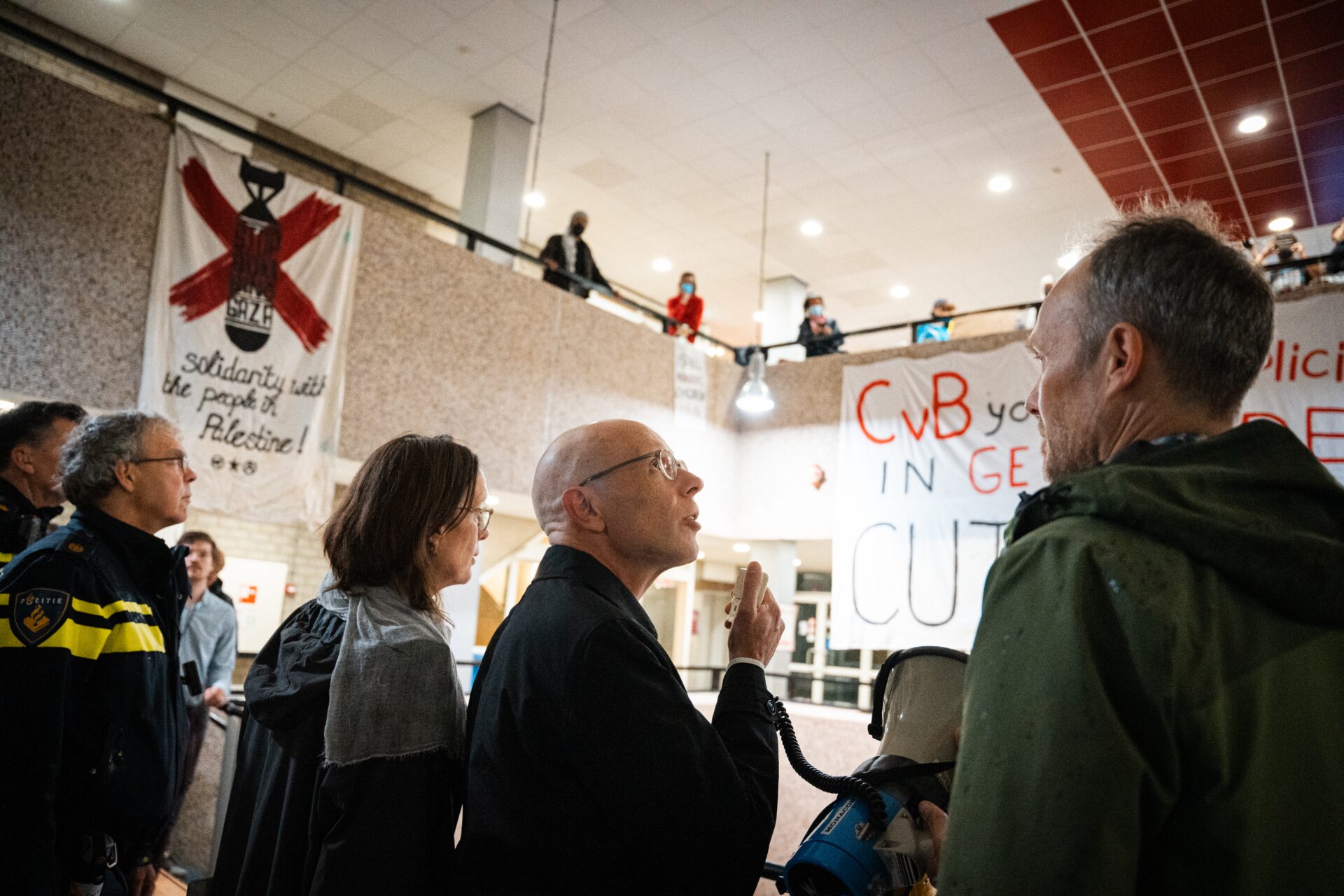
In hindsight, would you have done things differently to prevent the conflict from escalating among the protesters?
‘Since the start of the encampment, the protesters used a demand structure, which I understand from their perspective. Looking back, I don’t think I was successful enough in breaking through that structure. I often wonder how we could have embarked on a better conversation with each other, but to be honest, I don’t yet have an answer to that.’
When you became President of the Executive Board in 2017, you said that you wanted to connect people, the opposite of polarisation. Have you been sufficiently successful in that during your time as President?
‘The question implies that I have not always been successful, but I have tried very hard to seek that connection, inside and outside the university. So, not only on campus and with the Radboud university medical center, but also in The Economic Board, with other knowledge institutions and companies in the region, with the municipality and the province. Or within OnePlanet, for example, where we are working with Wageningen University, Radboud university medical center and Imec to develop new technology relating to healthy living and nutrition. I was also told that I played a connecting role with the Universities of the Netherlands and the European university network The Guild.’
On campus, on the other hand, groups were becoming increasingly polarised, whether in terms of woke, Gaza or social safety. How do you view that development?
‘In that respect, our campus really reflects society. All opinions are represented. During the alternative campaign against the budget cuts, last November, I spoke on stage in front of the Linnaeus Building about the importance of tolerance. On a university campus, it is important to allow all voices to be heard. Particularly at a university, you must be extremely careful about censoring dissenting ideas or findings, because they often lead to new science or knowledge.
“Are we all always tolerant enough to listen to each other?”
‘Everyone should be able express themselves, but that comes with the responsibility to listen to each other. I sometimes wonder whether we are always tolerant enough to do that. Listening to each other is very important in a world where things can change so quickly and points of view become divergent. Are we able to tolerate that from each other?’
While you were President, there were several dialogue sessions on campus to promote listening to each other, for example about university identity or social safety. That also attracted criticism. “Where are the decisions?”, Professor Klaas Landsman wondered in an opinion piece on Voxweb.
‘As the Executive Board, we certainly took decisions. But sometimes they were complicated decisions, with huge consequences for those involved. That requires care. You may think we listen too much or seek too much dialogue, but I think that’s important to for a supported and informed decision.’
According to pro-Palestine protesters, ties with Israeli institutions should have been severed long ago. They feel that the International Partnerships Advisory Committee is a way of putting everything on hold. Can you empathise with that idea?
‘I understand their impatience, but care is needed here too. The situation in the Middle East is devastating, as the Executive Board immediately asserted. The human rights violations, violence and failure to allow humanitarian aid are appalling. In an open letter in Trouw the rectors stressed the importance of maintaining ties with fellow scholars, especially during difficult times. At the same time, we want to know exactly what that involves and what we may or may not be unintentionally contributing to. That’s a complicated question. The Advisory Committee is now looking into the matter.’
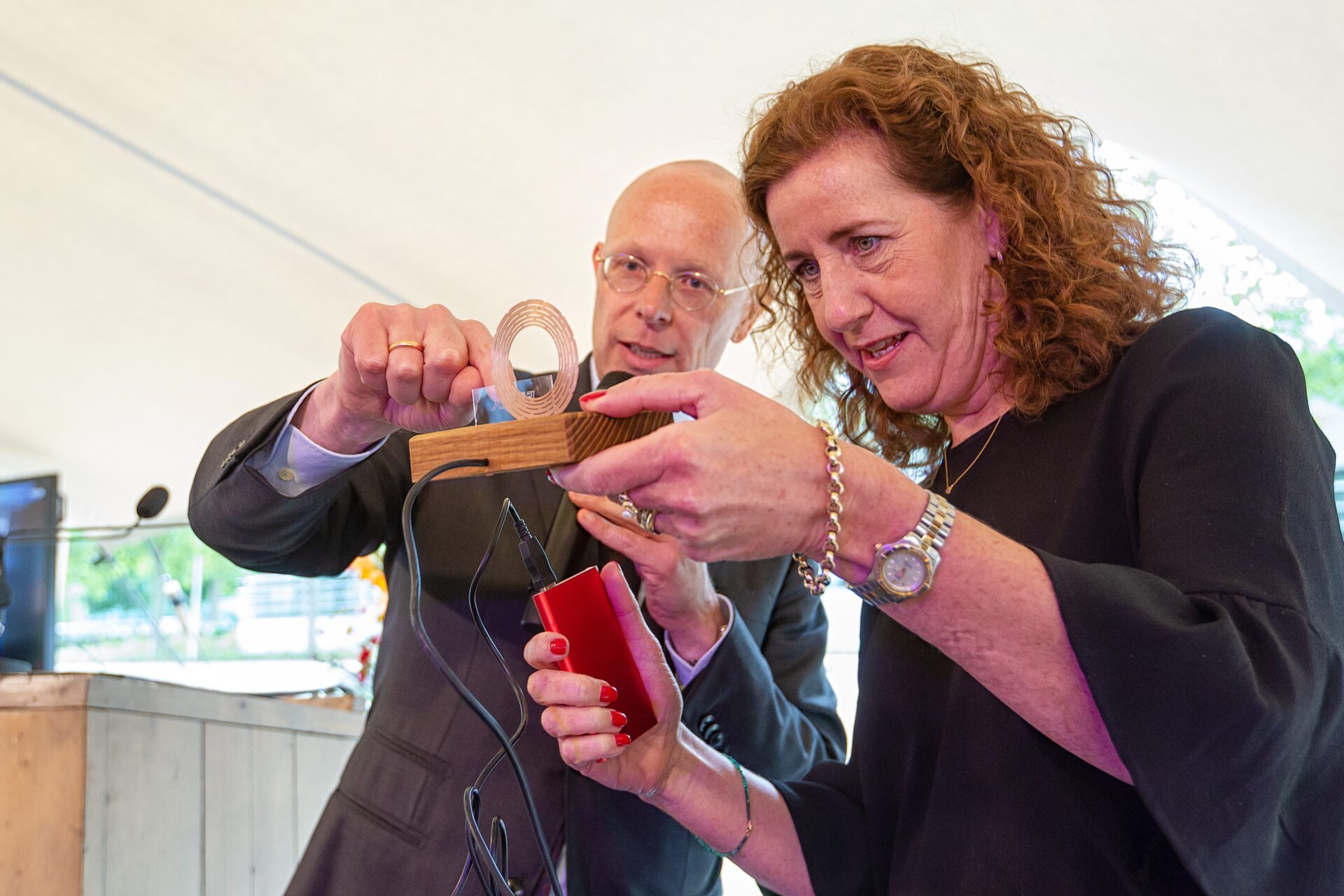
Before you became President of the Executive Board, you were a dean, so you already knew the university well. Was that an advantage or a disadvantage?
‘Both. It took me a while to get used to my new role. When do others and when do you feel that you are the President? We soon embarked on the demerger of the university and the Radboud university medical center, which was an intensive process. It was then an advantage that I already knew the medical faculty.’
With the appointment of Alexandra van Huffelen, a President with a very different profile has been chosen. A good thing?
‘You should never rule from beyond the grave and I wasn’t involved in selecting the future President. Having said that, it can obviously be a disadvantage that someone from outside the organisation first needs to get to know it. At the same time, it is an advantage that someone with a lot of experience looks at the organisation from a fresh perspective and brings innovation. On many university boards, you therefore see a mix of internal and external people. That’s healthy. And our Vice President and rector obviously know the university well.’
What will be her biggest mission?
‘The cuts to higher education. The importance of universities therefore needs to be continuously highlighted.
‘When you look at the geopolitical challenges facing Europe, universities and knowledge institutions play a very important role in this. Besides being a Nijmegen, Gelderland and Dutch university, we are also a European and a multilingual university. In recent years, we have invested heavily in the NeuroTechEU, a joint initiative of European universities. That kind of development will certainly become more important.’
Just now, you mentioned that during your walking holiday, you also thought about the departure of Rector Magnificus Han van Krieken, following the announcement of a complaint about unacceptable behaviour. How do you look back on that?
‘It is very important that social safety at universities has become a topic for discussion. At the same time, you see that everything is weighted heavily, especially for people in managerial positions. They have an extra responsibility. In the case of our former rector, it was about the choice of words in the moment and their interpretation that had major consequences for all involved.’
“Taking care in how we talk to and about each other is often lacking. I find that complicated”
‘Ultimately, it is always about how your behaviour impacts others. That applies to Han if he came across a certain way to a staff member. It also applies to the way media reports about it and the way people subsequently react. You can see how quickly things can escalate, with dire consequences. Taking care in how we talk to and about each other is very important and that is often lacking. I find that complicated.’
In retrospect, could you have done anything differently in your role as President?
Long silence. ‘As the Executive Board, we stated at the time that we thought it was courageous for Han to resign his duties to create space, also for the university’s centenary celebrations. These were weeks in which the Executive Board had to take many decisions in a short period of time with major consequences for those involved. And in doing so, you hope you have done the right thing. Or the least bad. I thought it was very courageous, and good, that Han was present during the festivities in the circumstances of that moment.’
Did you consider resigning yourself during this period?
‘Not really. It wasn’t an easy period, but I felt a great responsibility to all concerned and to the university to do my job to the best of my ability.
‘Going on stage during the celebration to say something, when everyone knows what’s going on, and then finding the right words. And still trying hard to connect in such a situation. That’s not running away, that’s trying to be there. That’s what I chose to do.’
Do you still have much contact with Han van Krieken?
‘We occasionally text each other and regularly meet at events.’
You were President of the Executive Board during Covid, which had such a major impact on student wellbeing. To what extent does that still affect the lives of today’s student generation?
‘That’s hard to say, because there is no comparable group of students who have not experienced Covid that we can contrast it with. With my own children, I saw what they missed out on when forced to sit behind a screen all the time. Meeting each other in clubs, playing sports or music together: that’s so incredibly important, but it was no longer possible.’
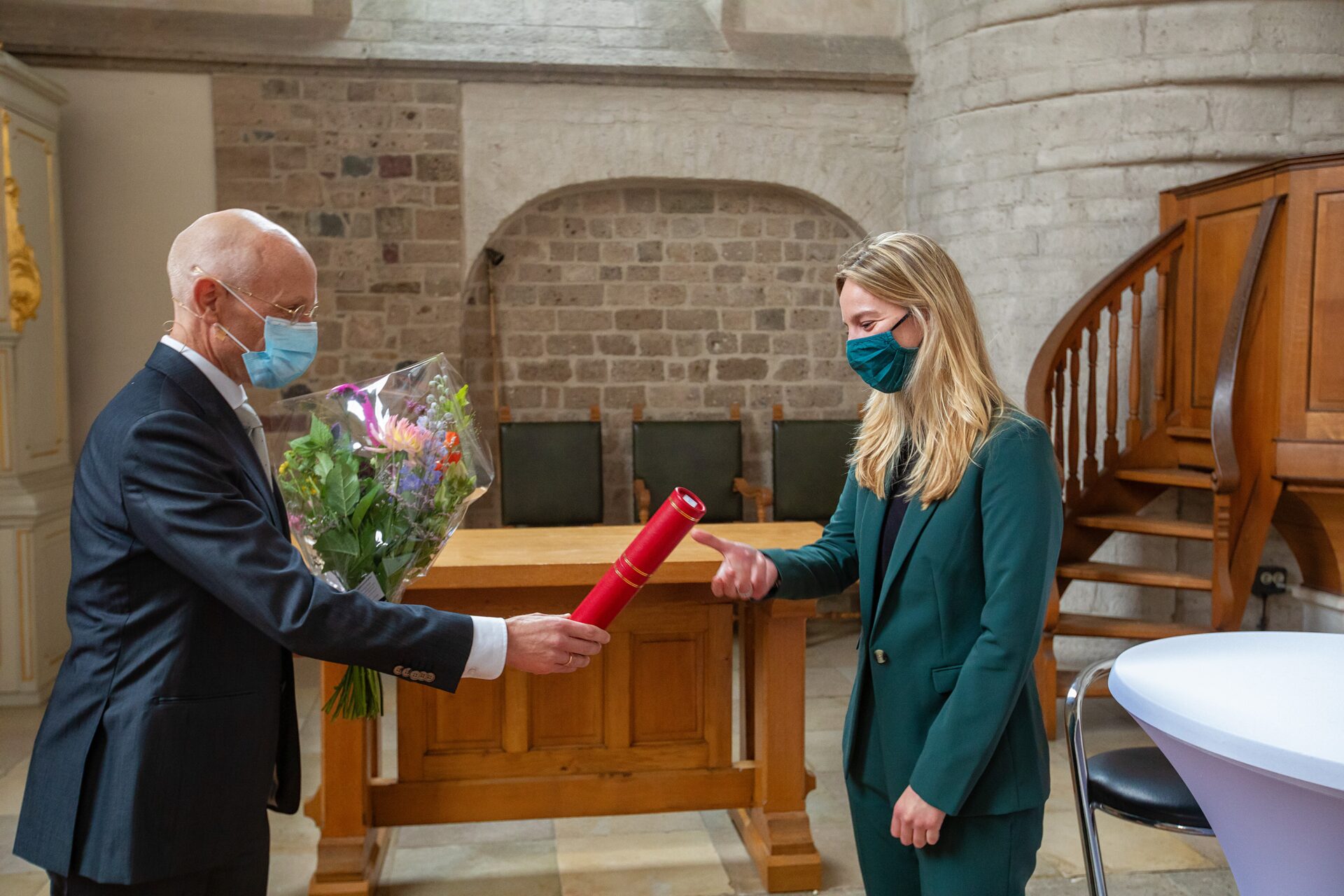
‘I have great respect for the students and all the staff who kept university life going back then, but I was also very happy when the campus came back to life. We want to make sure that everyone who belongs at a university really feels at home there and can fully enjoy student life. Because it is so important for your development as a student.’
What is your fondest memory as President?
‘Talking to scholars, staff or students who enthusiastically explain their ideas, losing track of time. I have sometimes had enterprising students visit me to practise their pitch on behalf of their Mercator Launch. Moments like these were the icing on the cake in my schedule – you can’t say yes to everything – but if you never do things like that, you miss the best bits. Or being shown around HFML-FELIX, where a scientist explains why a magnet is so important for the heel prick at Radboud university medical center. That gets me excited.’
“The Works Council (OR) and USC regularly asked probing questions, for example about the Code of Conduct”
‘Once I spent two hours accompanying mail delivery driver Michel Derkse on his round, which was really fun and insightful. Without the passion of professional services staff, we could not do teaching and research here. I also enjoyed the discussions with participational bodies. The Works Council (OR) and USC regularly asked probing questions, for example about the Code of Conduct “Is that really necessary?”, I sometimes thought. But that’s how we produced a document that was widely supported. So yes, it is necessary.’
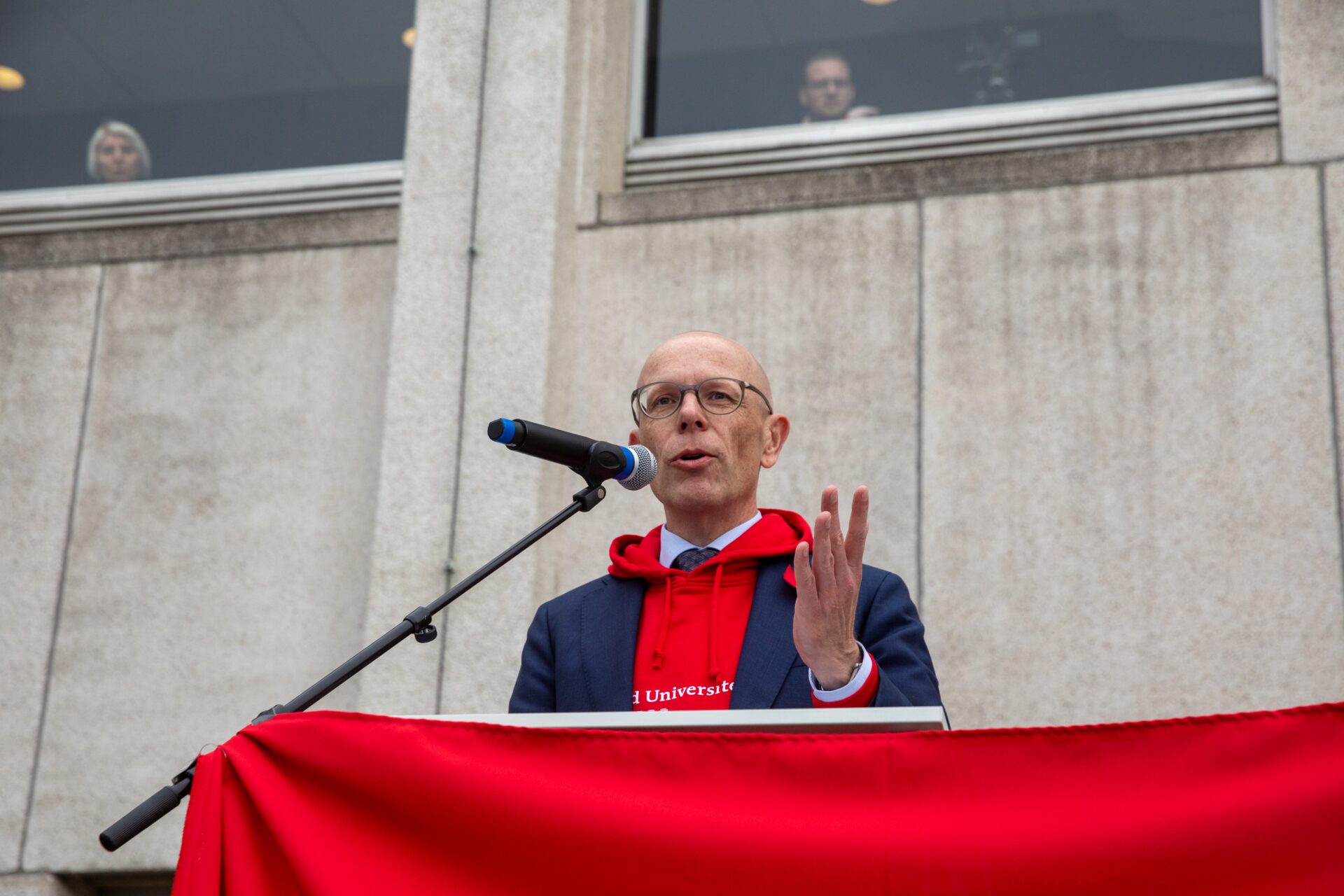
Do you know what you will do next?
‘No. I love every part of academic higher education and research, as well as the diversity of tasks in a job like President of the Executive Board. Perhaps I’m looking for something where I can combine both elements. I’d like to continue to broaden and deepen.’
‘But first, I’m going to disconnect for a while during a sabbatical. I’ll use the time to read up on my subject area and beyond and make contacts. And to walk, as long as it takes until new insights emerge.’



